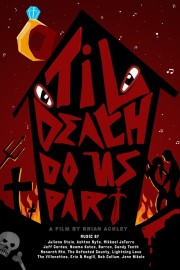Til Death Do Us Part
For writer-director Brian Ackley, “Til Death Do Us Part” is a filmmaking exercise, an artistic endeavor rather than a narrative one along the lines of “Uptown” and “Alienated.” It’s an itch that he scratched because, as a filmmaker, he had an idea, and wanted to execute it. That’s an important thing to take in to the film’s 73 minutes; the other important thing to keep in mind is that it’s an experiment in style and storytelling- you might get lost, at times, but if you stay with it, things will snap back into focus.
All of Ackley’s films I’ve seen where he’s been a writer-director have had to do with relationships, and “Til Death” is no different. What is different is that Ethan (Ackley himself) and Berkeley (Lexie Miller) are on the same page in theirs; there is no disconnect between the two, unless you want to take the fact that they’re serial killers into account. These two aren’t Bonnie and Clyde or Mickey and Mallory, however, but a suburban couple who just happens to get turned on with one another. They tell each other their stories, and they get excited. We see them together, apart, we see them having flashbacks to the past, and (maybe) glimpses of their future. We see happy times with them and their dog, and the pain that happens when their dog passes away. All this builds to a climax Ethan has planned for them, as they each have a victim to ply their trade on. It’s an exciting prospect for them both; the way it ends up is more than a little shocking for them.
IMDb lists this film’s genre under “Music,” as well as “Horror” and “Thriller,” and that’s appropriate, because more so than dialogue, and even the title cards interspersed throughout the film, Ackley uses music to navigate us through the narrative emotionally, making it a part of the storytelling in a way that is alive and involves us in the story in a way the film sometimes is not able to do otherwise. It’s well worth watching, though; Ackley is challenging himself as a visual and narrative filmmaker beyond what he did in “Uptown” and “Alienated.” Working as his own cinematographer, there are a lot of great visual flourishes and techniques he’s using here to tell this story that make the film feel like a narrative music video, and also makes one think of the way the silent filmmakers of early film worked with their visual language, and set it to music. The emotional connection to the characters matters, but it’s almost incidental when it comes to the way the story is told. It all comes together at the end, though, when this story makes its way to what feels like a natural conclusion. Ackley has a knack of doing that, regardless of the type of story he’s telling.










